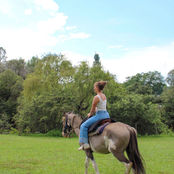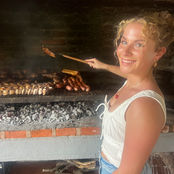Brooke Evans
Spanish & International Business
Córdoba, Argentina
February to June 2024
When I embarked on my study abroad journey to Córdoba, Argentina, my primary goal was to improve my Spanish-speaking skills. I wanted to build confidence in my ability to communicate in Spanish and navigate real-world conversations beyond the classroom. However, as my experience progressed, I realized that my learning extended far beyond just language acquisition. I gained invaluable cultural insights, built meaningful relationships, and developed a more global perspective. For example, I initially focused on learning grammar and vocabulary, but by the end of my stay, I found myself confidently negotiating prices at local markets, engaging in networking events exclusively in Spanish, and having deep conversations with locals about Argentine history and culture. These experiences demonstrated how immersive learning can accelerate language proficiency and cultural understanding in ways a traditional classroom never could.
One of the most striking cultural differences I observed between Argentina and the United States was the depth of hospitality and community in Argentina. From the moment I arrived, my host mom welcomed me with homemade empanadas and a heartfelt card. Her warmth and generosity set the tone for the rest of my experience. I found that Argentine culture places a strong emphasis on personal connections. Everybody is very personable and genuine. For example, when greeting someone and saying goodbye, it is common to give everyone in the room a hug and a kiss on the cheek. Here in the U.S. it is common to greet family and friends with a hug, but not strangers. This sense of community was also evident in public spaces. In Argentina, people linger in cafés for hours, engaging in meaningful conversations, whereas in the U.S., there is a greater emphasis on efficiency and quick service.
Another cultural distinction I observed was the difference in work-life balance. The Argentine mentality leans towards "working to live" rather than "living to work," a contrast to the often fast-paced and career-driven culture in the U.S. In Argentina, people value taking breaks during the workday, enjoying long lunches, and prioritizing family and social life over work obligations. I witnessed this firsthand in my internship, where my colleagues took time to chat over coffee and engaged in personal conversations before diving into work. This was a stark contrast to the American workplace culture, where productivity and efficiency are often emphasized above all else. Experiencing this mindset shift made me reevaluate my own approach to work-life balance and appreciate the importance of fostering meaningful relationships alongside professional ambitions.
One of the most meaningful aspects of my experience in Argentina was my exposure to its history, particularly through my host mother, Giselle Parodi. Giselle is a human rights activist for the Abuelas de Plaza de Mayo (Grandmothers of Plaza de Mayo), an organization dedicated to finding the children stolen during Argentina’s military dictatorship (1976–1983). During this period, known as the Dirty War, the government carried out a campaign of state terrorism, targeting political dissidents, activists, and suspected opponents. An estimated 30,000 people were forcibly disappeared (desaparecidos)—kidnapped, tortured, and often murdered. Many pregnant women were detained, and their babies were taken and illegally adopted by military families or regime sympathizers.
Giselle’s mother, Sonia Torres, was the founder and president of the Abuelas de Plaza de Mayo association in Córdoba. Women like her dedicated their lives to seeking justice, uncovering the fates of their loved ones, and restoring the true identities of the stolen children. Since its founding in 1977, the organization has helped recover over 130 missing grandchildren, making their work a symbol of justice and resilience in Argentina. Hearing firsthand accounts from Giselle about these events was both inspiring and heartbreaking, deepening my understanding of Argentina’s past and the ongoing fight for human rights.
Traveling throughout Argentina provided me with invaluable insights into the country’s rich cultural diversity. Each region had its own distinct identity, shaped by its geography, history, and traditions. In Buenos Aires, I was struck by the city's European influence, seen in its architecture, cafés, and tango culture. Visiting landmarks such as La Casa Rosada and the Evita Museum helped me understand Argentina’s political history and the lasting impact of figures like Eva Perón. Exploring the colorful neighborhood of La Boca, where tango originated, deepened my appreciation for Argentina’s artistic and musical traditions.
My trip to Mendoza offered a completely different experience. Known for its world-renowned wine production, Mendoza introduced me to the deep connection between Argentine culture and viticulture. Touring vineyards and learning about the winemaking process underscored the importance of agriculture to the country’s economy and cultural heritage. Additionally, the slower pace of life in Mendoza compared to the bustling streets of Buenos Aires reflected Argentina’s emphasis on work-life balance.
One of the most memorable aspects of my travels was my journey to Jujuy and Salta in the north. Here, I encountered breathtaking landscapes such as the Salinas Grandes and the Cerro de los Siete Colores. The indigenous influence in this region was much more pronounced, and I had the opportunity to learn about the traditions of the Quechua people. This experience challenged my previous understanding of Argentina as a primarily European-influenced country and opened my eyes to the cultural and ethnic diversity within its borders.
Another unforgettable destination was Bariloche, situated in Patagonia. Unlike the arid landscapes of the north, Bariloche was lush, mountainous, and filled with pristine lakes. Here, I had my first experience skiing, which further demonstrated the regional contrasts within Argentina. Learning about the Swiss and German influence in Bariloche, evident in its alpine architecture and chocolate-making traditions, highlighted how immigration has played a key role in shaping Argentina’s identity.
Living abroad challenged me to step outside my comfort zone and reconsider how I perceive myself and my role in society. In Argentina, I was often viewed as both an outsider and an ambassador for my own culture. This dual role encouraged me to reflect on my identity as an American and how cultural perceptions shape interactions. I became more conscious of how I represented my country and learned to approach cultural differences with curiosity rather than judgment. This experience also reinforced my passion for international business and marketing. Working at Cofactory allowed me to see firsthand how businesses operate in a global setting. This hands-on experience confirmed my interest in pursuing a career in global marketing and trade, where cultural competency and adaptability are essential.
Studying abroad profoundly enriched my academic experience. My coursework at Universidad Blas Pascal not only improved my Spanish but also deepened my understanding of Latin American business practices, history, and social issues. Learning about the Jesuit influence in Córdoba through site visits and historical tours helped contextualize the city’s development. Additionally, my involvement in projects at Cofactory complimented my international business studies at Clemson, bridging the gap between theoretical knowledge and real-world application. Beyond academics, I gained skills in cross-cultural communication, problem-solving, and adaptability, that will serve me well in my future career. I now have a greater appreciation for the complexities of global business and the importance of cultural awareness in professional settings.
My semester in Córdoba, Argentina, was transformative in every sense. It pushed me beyond my linguistic and cultural comfort zones, deepened my understanding of global issues, and reaffirmed my aspirations in international business. The friendships I made, the places I explored, and the lessons I learned will stay with me for a lifetime. This experience not only enhanced my academic and professional goals but also shaped me into a more confident, culturally aware, and globally-minded individual.
























